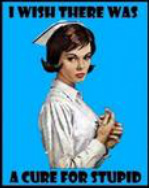This is the time of year when soon-to-be-graduating nursing students start to panic. Their college years are almost over. In two short months, they will be graduating and preparing for the NCLEX exam - It’s time to get a job. As if there isn’t enough going on, they are faced with the critically important task of writing a resume. I am posting some suggestions I offer to them below:
Some ways to describe student nurse /PCA duties:
Instead of "I gave baths and assisted with ADLs"
Say I assisted patients in meeting their personal care needs and provided individualized attention/interventions while encouraging patient involvement in self-care, promoting independence, and maintaining dignity
Instead of: "I was a float"
Try: I have experience adapting to any hospital unit / a variety of clinical areas /changing situations/environments. I have the ability to quickly establish rapport and a positive working relationship with nurses and ancillary staff. I can quickly orient myself to unit, independently take initiatives/ require minimal assistance/ encouragement/ instruction…
I can function as an integrated member of the staff/team in any situation and deliver the safe, effective/efficient care to complex pts. I can readily/easily adapt methods/ interventions to a wide range of situations.
Instead of "I was a sitter"
Try: I have experience providing focused, one-to-one care and ensuring a safe, nurturing/caring/positive environment for patient’s who are at a significant risk for injury or complications.
Other descriptions of duties
-Acted as pt advocate, expressing pt concerns/needs/desires to nurses and other staff who were unable to devote/ spend as much time with patient
-Utilized the time spent providing personal care/bathing to: perform thorough skin assessments, assess nutrition and hydration, look for signs of neglect and abuse, spot early signs of skin breakdown and/or identify pts who were at risk, promote measures to prevent skin breakdown, initiate toileting schedule, etc
- Ensure adequate nutrition and hydration, assess for problems with chewing and/or swallowing /eating difficulties that may increase risk of aspiration/ poor nutrition. Assisted pt/family with increasing safety awareness/promting a safe environment; set-up meal, encourage independence/feed self, ensure proper positioning to promote adequate food absorption and digestion, prevent aspiration, etc.
-Accurately monitored/assessed and reported/recorded intake and output, nutrition/hydration status.
-Educated pts/families on fall prevention, safety risks, use of call bell, importance of calling for assistance, etc.
-Ensured adequate lighting, clear pathways, safe transfers, promoted/reinforced proper positioning, transfer techniques, use of assistive devices.
-Ensured that all items were within reach and pt was comfortable, adjusting temperature, lighting, clothing, bedding/ linen was clean, dry and wrinkle free.
- Assisted with communication with families, making pt/family needs known, answered questions, directed to appropriate sources to answer questions, etc.
- Promote socialization, conversation, allow patient to express concerns in a non-judgemental, non hurried environment.
- Assessed level of orientation, ability to read and understand written material (menu, paper) and comprehend what was read, ability to make decisions (meal choices), etc.
Some ways to describe student nurse /PCA duties:
Instead of "I gave baths and assisted with ADLs"
Say I assisted patients in meeting their personal care needs and provided individualized attention/interventions while encouraging patient involvement in self-care, promoting independence, and maintaining dignity
Instead of: "I was a float"
Try: I have experience adapting to any hospital unit / a variety of clinical areas /changing situations/environments. I have the ability to quickly establish rapport and a positive working relationship with nurses and ancillary staff. I can quickly orient myself to unit, independently take initiatives/ require minimal assistance/ encouragement/ instruction…
I can function as an integrated member of the staff/team in any situation and deliver the safe, effective/efficient care to complex pts. I can readily/easily adapt methods/ interventions to a wide range of situations.
Instead of "I was a sitter"
Try: I have experience providing focused, one-to-one care and ensuring a safe, nurturing/caring/positive environment for patient’s who are at a significant risk for injury or complications.
Other descriptions of duties
-Acted as pt advocate, expressing pt concerns/needs/desires to nurses and other staff who were unable to devote/ spend as much time with patient
-Utilized the time spent providing personal care/bathing to: perform thorough skin assessments, assess nutrition and hydration, look for signs of neglect and abuse, spot early signs of skin breakdown and/or identify pts who were at risk, promote measures to prevent skin breakdown, initiate toileting schedule, etc
- Ensure adequate nutrition and hydration, assess for problems with chewing and/or swallowing /eating difficulties that may increase risk of aspiration/ poor nutrition. Assisted pt/family with increasing safety awareness/promting a safe environment; set-up meal, encourage independence/feed self, ensure proper positioning to promote adequate food absorption and digestion, prevent aspiration, etc.
-Accurately monitored/assessed and reported/recorded intake and output, nutrition/hydration status.
-Educated pts/families on fall prevention, safety risks, use of call bell, importance of calling for assistance, etc.
-Ensured adequate lighting, clear pathways, safe transfers, promoted/reinforced proper positioning, transfer techniques, use of assistive devices.
-Ensured that all items were within reach and pt was comfortable, adjusting temperature, lighting, clothing, bedding/ linen was clean, dry and wrinkle free.
- Assisted with communication with families, making pt/family needs known, answered questions, directed to appropriate sources to answer questions, etc.
- Promote socialization, conversation, allow patient to express concerns in a non-judgemental, non hurried environment.
- Assessed level of orientation, ability to read and understand written material (menu, paper) and comprehend what was read, ability to make decisions (meal choices), etc.


 RSS Feed
RSS Feed